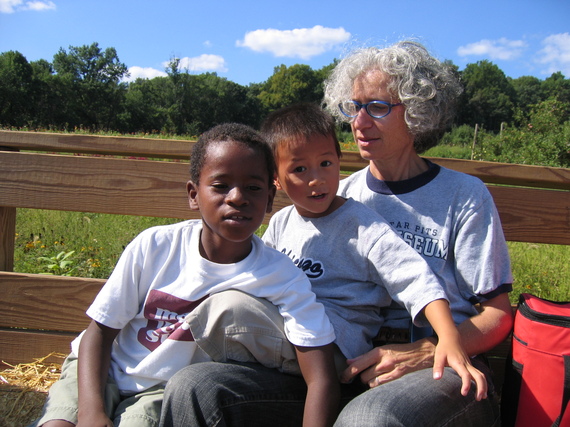Dr. Jane Aronson with her Des and Ben (2004)
Left to Right: Des (Age 6), Ben (Age 4), and Dr. Jane Aronson
I am still working with families adopting children abroad and at home in the US. I don't want to give up this very rewarding work. To see a family be created out of pain and loss on both sides is a miracle.
A couple in their mid-forties with no children, and married 10 years, desperately wanted a child. They decided to adopt from an Asian country because one of them is Asian and the child and the father will speak the same language to start their life together.
They contacted me through my website and I helped them by reviewing a very detailed abstract about the child's family and his medical profile. There were 12 pages of information about this child's birth mother, birth father, and grandparents as well. There was an actual genogram with several generations depicted. The social history for this infant on his way to becoming a toddler was rife with family dysfunction, substance abuse, lack of education and inopportunity.
The birth mother is in her late teens and has lived homelessly with her boyfriend. She was judged to be "mentally defective" by the social workers at the adoption agency in the city where she lives. The culture of this country deems people who are poor, "retarded" and "inferior" - and those are the actual words used in the referral. The child is in a small orphanage and has developmental delays and is not speaking, but is getting speech therapy and is progressing. I requested a hearing test be done in the orphanage abroad and then had the tests reviewed by the audiologist and ENT specialist here in the US. He has mild hearing loss that could simply be caused by a past history of ear infections.
His strides in expressive language are heartening and encouraging. He looks lonely in the photos that are provided to the parents and shared with me. The parents are from two distinctly different cultures and they react differently to the boy's issues. One is judgmental and anxious and the other parent is just anxious, but more hopeful. I find myself being impatient with the parent who is judging the child just the way that the agency abroad judges the child. This is cultural for sure, but hard all the same. How is it possible to judge a child because of the mistakes of the parents?
The adoptive parents contact me by email to tell me that they are traveling to meet him this week. They request a phone call to help them know what to do when they meet their prospective child. They are very anxious on the phone. They want answers and they want security and guarantees. I move them away from expecting me to tell them what to do. One of the parents says "uh huh" after every few of my words almost interrupting my train of thought. He is not listening and wanting something else. He wants me to give him an exact script.
I instead do something that is simpler and really more focused on the child. I ask the parents to consider that the child will want to be liked when they meet him. I then try and explain more about how the child is feeling and point out that the child is lonely in an orphanage without a parent. It is a moment when the child will have a lot of attention and that this attention will be fun for the boy. I also focus the parents so that they understand that the meeting will be a chance for them to know this little boy.
I recommend that they take photos and short video clips of him with each parent so that they can look back at the interaction and enjoy those connections. I suggest to the parents ways in which to connect and attach to the child, such as using board books to show pictures and singing children's songs with an iPad app that provides parents with ways in which to play through music and reading. I also suggest that they bring some simple toys like cars, blocks, and dolls. I advise them to get down on the floor with him to play, pretend and interact. I also recommend that they have a meal together so that they can enjoy a routine activity with him and role model that social activity. They could taste his food and he could taste theirs.
I cry when I tell parents that the child is just looking for love and that the child will be happy if he knows that he is wanted. As I write this sentence, I see myself in the orphanage meeting my now 15-year-old son for the first time when he was 4 months old. He was so lonely and stared off in the distance...he was disconnected and dazed. And then we made such cute sounds and called him nicknames and uttered his name - Ben. We worked hard to get him to look at us. We held him close all day and watched him sleep. When he awakened we changed him and held him and sang to him and spoke to him. Then we fed him, looked at him and he looked at us. We put him on a play blanket and showed him pictures and put sweet music on a tape recorder....was a long time ago; there was no iPhone or anything like it.
We made sure that he knew we cared about him and only him. We wanted him to feel our love so he could let go and not be so brave...not so brave and vigilant...not so internal and insulated...not alone anymore.
Dr. Jane Aronson
CEO & President, WWO
